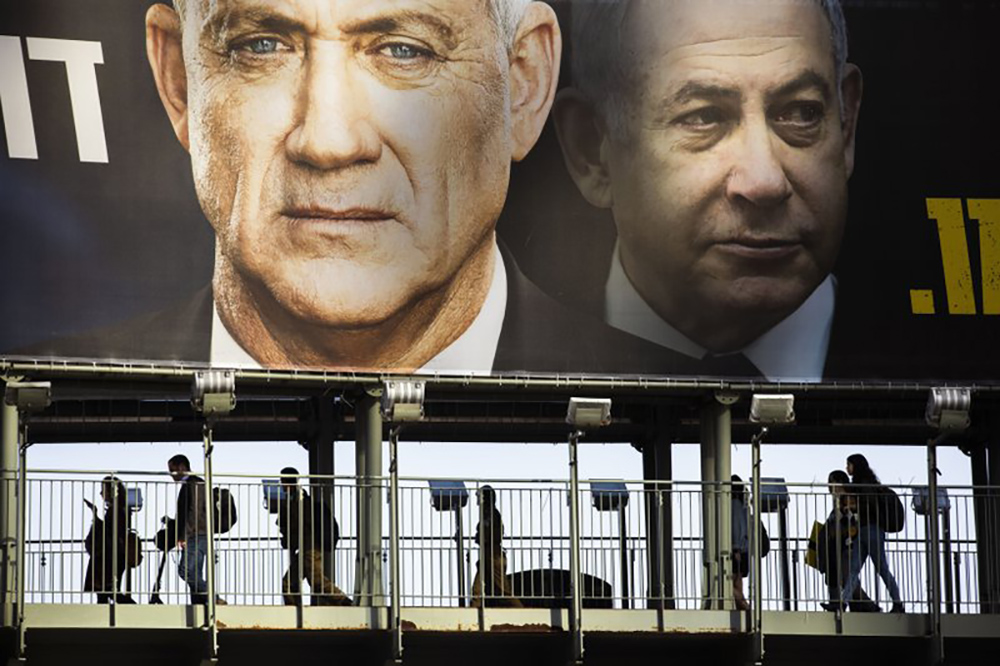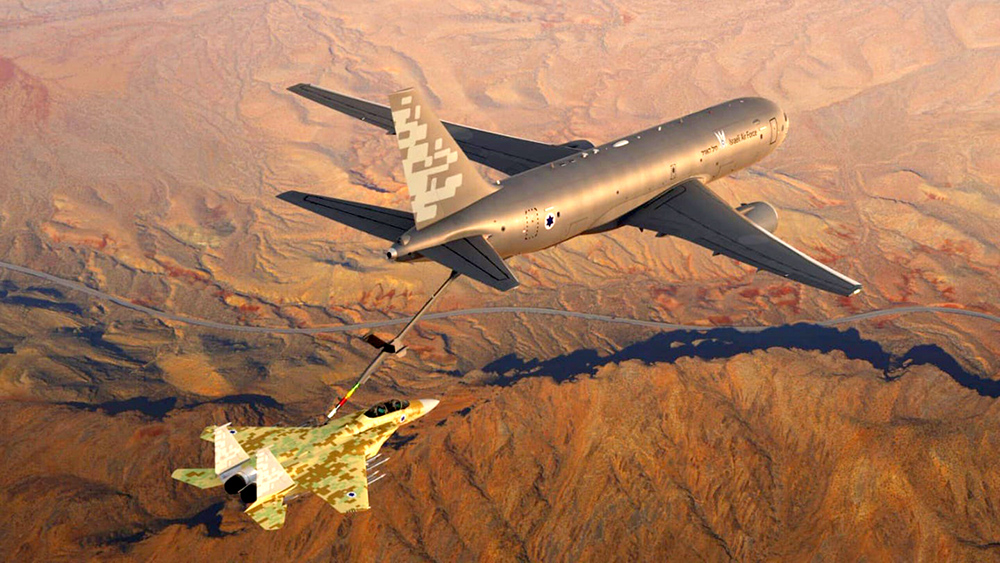Edited by: TJVNews.com
Israel has made its first move under the recently approved procurement program over the weekend, signing an agreement for two Boeing KC-46 aerial refueling tankers.
Mishel Ben Baruch, head of the Israel Ministry of Defense Mission to the U.S., Brig. Gen. (Res.), signed a Letter of Offer and Acceptance (LOA) for two KC-46 Tanker Jets, to be manufactured by the Boeing Corporation. In the next phase, two additional tanker aircraft will be acquired out of a total of up to eight that will make up the future fleet.
As part of the agreement, the aircraft will be fitted with unique Israeli systems in accordance with the operational requirements of the Israeli Air Force (IAF). The first aircraft delivery is expected by the middle of this decade.
According to a report on thedrive.com web site, “the Israeli government has also given the green light to purchases of “advanced munitions” and a new heavy-lift helicopter, either a variant of the H-47 Chinook or CH-53K King Stallion.

The report on thedrive.com indicated that these purchases for the Israeli Air Force (IAF) will be “conducted via U.S. military channels, with funding provided by the Foreign Military Financing (FMF) initiative. In 2018, the Trump Administration approved a 10-year memorandum of understanding with Israel that covers $3.3 billion in FMF aid. FMF provides allies with block grants of money for military purchases, with the stipulation that a significant percentage is spent with U.S. companies.” The Israeli Ministry of Defense has confirmed that similar procurement processes will be launched to buy the additional F-35Is, new heavy-lift helicopters, and undisclosed armament.

Defense Minister Benny Gantz said, “I welcome the progress in the procurement plan, which is critical at this point in time. It is a cornerstone of the IDF’s security concept.
“I would like to thank our great friend the United States for supporting the State of Israel on all levels. We will continue to work to complete the agreements that will enable the IDF to fulfill its purpose and to move forward with the missions facing us in the various arenas, near and far, at sea, in the air, on land and in cyberspace.”
As part of the agreement, the tanker aircraft will be fitted with unique Israeli systems in accordance with the operational requirements of the Israeli Air Force (IAF). The first aircraft delivery is expected by the middle of this decade.
The procurement plan, based on U.S. security assistance, is crucial to strengthening the IAF and for the IDF’s QME (Quality Military Edge) in the decades to come, the IDF says.
The plan includes the procurement of a new fleet of F-35 aircraft, KC-46 refueling aircraft, helicopters to replace the “Yasur,” advanced munitions, air defense systems, marine and ground platforms, cyber systems and more.
Four new foreign orders for KC-46 tankers are welcomed news for Boeing and its Puget Sound region suppliers that make parts for the military variant of the 767 wide body jet, which is made in Everett and converted into a special military aircraft at a nearby modification center, according to an article on the bizjournal.com web site.
The report indicated that no delivery date has been specified for Israel’s tankers. The Boeing KC-46 aerial refueling tankers will replace Israel’s aging fleet of converted Boeing 707s, which are almost 60 years old. The exact number of converted 707s the IDF operates remains a state secret, according to the report on the bizjournal.com web site.
The KC-46 can carry some 95,000 kg (210,000 pounds) of fuel and boasts a range of 11,800 km (6,385 nautical miles).

Thedrive.com reported that Boeing faced “competition for Israeli orders from the Israel Aerospace Industries’ Bedek Aviation Group which had offered second-hand Boeing 767s converted into tankers. IAI had previously supplied similar 767 tanker conversions to Brazil and Colombia.”
The bizjournal.com report added that the deals are being financed using U.S. military aid — called security assistance inside Israel.
Earlier this month, however, a top U.S. Air Force commander lamented Boeing’s performance with the KC-46 program, according to the bizjournal.com report.

Earlier this month, General Jacqueline Van Ovost, the head of Air Mobility Command, described the Pegasus as a “lemon,” according to thedrive.com report. It has ongoing problems that prevent it from performing its primary aerial refueling mission on a day-to-day basis. Full operational capability now won’t happen until late 2023 or 2024 at the earliest, according to officials.
The bizjournal report said that the KC-46 has been plagued by problems with its remote vision system that allows onboard operators to connect the jet’s fuel lines to incoming receiving aircraft. It is also experiencing electrical wiring woes, gas leaks and problems with its onboard cargo restraint devices. Altogether, special charges and write-downs have totaled more than $5 billion.
Still, Boeing CEO David Calhoun said in October the program is turning the corner.
The IAF could potentially acquire a Pegasus that differs significantly from the U.S. Air Force model and it should be noted that boom-equipped KC-767 tankers have been operating now for many years with both Italy and Japan, according to the report on thedrive.com
The IAF appears to have decided for now to focus on the F-35I — the local name “Adir” means “Mighty One” —rather than supplementing and/or upgrading its existing fleet of F-15s, according to the report on thedrive.com web site.
The drive.com report said that the F-35I models are broadly equivalent to the F-35A, but incorporate an increasing proportion of Israeli-made technology and weapons, with these local changes being trialed using a unique F-35I testbed that arrived in the country last November.
This sale marks the first time that the U.S. had ever allowed Israel to buy air-to-air refueling tankers. In March of 2020, the sale to Israel was approved by the State Department, with the support of the Trump administration. The sale of the four tankers were half the amount that Israel originally requested.
The report on the bizjournal.com web site indicated that the total value of the deal was about $2.2 billion. The purchases were delayed in Israel due to the lack of a national budget and some political infighting.
In December of 2020, Israel Defense Ministry Director-General Amir Eshel said that, “there is no country in the world that flies platforms that are this old.” He suggested that delaying the purchase would undermine Israel’s security, according to the report.
Speaking to reporters, Eshel said “To fly a refueler or a helicopter with more than 50 soldiers inside is not trivial. These are non-trivial risk levels. If God forbid something happens, what would we say to ourselves? Our operational and safety needs are paramount. There is no other way to present it.”
Also purchasing four KC-46 jets was Japan.
The bizjournal.com report also indicated that the IDF is planning to purchase another squadron of Boeing’s F-15 fighter jets. However, this St. Louis-made model is currently being upgraded by Boeing’s defense unit. Israel’s army prefers to wait until the improvements are completed, Haaretz reported.
Israeli airstrikes have hit dozens of Iran-linked targets in Syria in recent years and at least one in Iraq. The U.S. has said it has supported Israeli strikes in Syria.
One of the major reasons Israel has embarked on this military hardware acquisition is to send a strong message of “peace through strength” to Tehran and the powers that be in the rogue regime. Iran has consistently threatened to attack Israel with nuclear weapons and its proxies in Lebanon and Gaza (Hezbollah & Hamas, respectively) have echoed the same bellicose rhetoric over the years.
Israeli Prime Minister Benjamin Netanyahu declared Tuesday that Israel will not permit Iran to arm itself with nuclear weapons to fulfill its oft-repeated goal of destroying Israel, according to a World Israel News report.
“On the eve of [the festival of] Purim, I would like to say to those who seek our lives, Iran and its proxies in the Middle East: 2,500 years ago, another Persian villain [Haman] tried to destroy the Jewish people and just as he failed then, so too will you fail today. We will not allow your extremist and aggressive regime to attain nuclear weapons,” Netanyahu said during a speech at a memorial service in northern Israel.
“We have not made the journey of generations, of thousands of years, to return to the land of Israel in order to allow the delusional regime of the ayatollahs to end the story of the revival of the Jewish people,” the prime minister said.
“We are not pinning our hopes on any agreement with an extremist regime such as yours. We have already seen the quality of agreements with extremist regimes such as yours, in the past century and in this one, with the government of North Korea,” Netanyahu said.
The WIN report indicated that in the 1990s North Korea agreed to end its nuclear weapons program, but years later withdrew from the international Nuclear Non-proliferation Treaty and set off its first nuclear blast in 2006. North Korea is known to be giving extensive military support to Iran, including ballistic missile technology that can be used to deliver nuclear weapons.
“With or without agreements – we will do everything so that you will not arm yourselves with nuclear weapons,” Netanyahu said at the ceremony marking the 100-year anniversary of the death of Zionist pioneer Joseph Trumpeldor and seven others defending the Jewish farming community of Tel Hai in the Upper Galilee in 1920.
The Purim festival celebrated each year recounts the story of how an evil advisor to the ancient king of Persia persuaded him to order the genocide of the Jewish people, but the king subsequently fell in love with a Jewish woman, Esther, who he took as his queen. Esther turned the tables on Haman, the evil advisor, and saved the Jews from destruction.
Iran’s political and military leaders have for decades said their national goal is to destroy Israel, which it calls a “cancer” that has to be removed from the Middle East.
WIN reported that Israel objected when world powers signed a deal with Iran in 2015 to restrict its nuclear activities, pointing out the numerous shortcomings of the agreement, particularly the fact that it didn’t address Iran’s murderous intentions, included ‘sunset clauses,’ and put limits on how the UN’s international nuclear watchdog agency, the International Atomic Energy Agency, could inspect Iran’s nuclear sites.
Last month, Iran announced it was increasing the rate at which it enriches uranium in a clear violation of the agreement.
WIN reported that U.S. Central Command commander Gen. Frank McKenzie warned Iran against provocations during a visit to Oman on Sunday.
“I would think this would be a good time for everybody to behave soberly and cautiously, and see what happens,” McKenzie said in an interview with AFP.
He urged Iran not to engage in “nefarious activities.”
“I think they would want to be recognized as a responsible member of the family of nations and a stable member in the region,” McKenzie said, according to the WIN report.
It remains to be seen whether McKenzie’s words fall on deaf ears. Early signs aren’t encouraging. A rocket attack on Feb. 14 in northern Iraq targeting U.S. forces killed a military contractor, injured a U.S. soldier and wounded five other contractors.
A newly established group called Saraya Awliya al-Dam took responsibility. It’s not known for certain if this is an Iran-backed group but it claimed it was taking revenge for the death of Iran’s Revolutionary Guard Corps Commander Qassem Soleimani, as was reported by WIN.
The Biden administration strongly condemned the attack, but stopped short of military retaliation until now. “The development represents an early test for President Biden in his role as commander in chief,” the Wall Street Journal reported.
Separately, the Journal reports that Iran may have been reinvigorated by the Biden administration’s decision to remove the terrorist designation from the Houthi rebels in Yemen, which Iran supports. The Houthis have launched drone strikes on Saudi Arabia since. Also, Iran-backed rebels from Iraq have launched attacks on Saudi’s north.
WIN reported that Voices in the Arab press, compiled by the Gatestone Institute’s Khaled Abu Toameh, say that Iran is testing President Joe Biden, who is seen as a “pushover.”
Abdulrahman Al-Rashed, former editor-in-chief of the Saudi newspaper Ashraq Al-Awsa, writes: “It has only been eight weeks since President Joe Biden was sworn into office, but Iran has already tested him on several fronts.”
Saudi columnist, Hella Al-Mashouh showed little optimism when she wrote, “Today, we are facing an imminent Iranian threat and a lenient American administration policy toward this danger. We will face this Iranian threat over the next four years.”
WIN reported that Sayed Zahra, deputy editor of the Gulf newspaper Akhbar Al-Khaleej, writes “The Iranian message to Biden is clear. It wants him to understand that Iran has many terrorist cards and can undermine security and stability in the region and present his administration with major challenges.
“The Iranian regime, in other words, wants to force the Biden administration to yield to its demands regarding sanctions and the nuclear agreement. The Iranian regime bases its calculations on the basis that Biden is weak with regard to the nuclear file.”
Saudi Arabia doesn’t appear to be waiting around to see if Biden passes the test. Reuters reports that the Saudis over the weekend announced they will invest more than $20 billion to establish their own domestic military industry. The move is reportedly to reduce their dependence on the U.S., which recently announced it was freezing certain arms sales to the Kingdom.
(World Israel News, www.bizjournal.com, www.thedrive.com)
Additional reporting by JV Staff Writer, Fern Sidman




